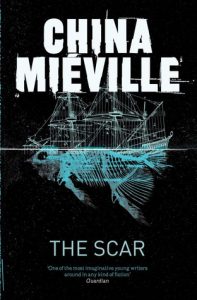The Scar by China Miéville
 Some years ago I had the pleasure of reading China Mieville’s Perdido Street Station, a bizarre steampunkish secondary-world fantasy featuring the most terrifying beasties I have ever come across in a book.
Some years ago I had the pleasure of reading China Mieville’s Perdido Street Station, a bizarre steampunkish secondary-world fantasy featuring the most terrifying beasties I have ever come across in a book.
I have just finished Mieville’s next book in that setting, The Scar, and it is every bit as weird and wonderful as its predecessor, filled with strange magics, horrifying creatures, compelling characters, and a twisty what-the-heck-is-really-going-on plot that kept me eagerly turning pages far into the night. I’ll need some time to think upon it, but I would not be surprised to someday be listing The Scar as one of my ten favorite books of all time. It’s that good.
It begins with Bellis Coldwine, a standoffish woman fleeing the city of New Crobuzon to avoid fallout from the calamitous events of Perdido Street Station. She hires aboard a ship as a translator, figuring to spend a few months away from her home until it’s safe to return. But her ship is captured by pirates, and she is forced to become a citizen of Armada, a square-mile floating island of chained-together hulls. To say more about where the plot goes from there would be spoiling too much, but The Scar is filled with politics, hidden agendas, characters with fascinating secrets, and plenty of action.
As in Perdido Street Station, Mieville’s ability to find the right words to craft unforgettable images is without peer. His diction is relentless in establishing his setting. Where in Perdido his words served to focus the reader on the filth and old grime of New Crobuzon, here in The Scar they drive home the brine-smelling, bivalve-encrusted, salt-rimed watery environs of Armada. The prose is at once dense and effortless, demanding attention but never sacrificing clarity – even when describing things that have no real-world frame of reference.
Mieville’s world-building is made more expansive in The Scar, showing us a wider view of the world of Bas-Lag than we saw in Perdido Street Station’s largely city-bound tale. He shows another level of mastery, not only filling his areas of focus with mind-blowing detail, but painting the distant edges of his geography with tantalizing hints and terrifying glimpses. I finished the book feeling as though I had seen a much wider expanse than where the story ultimately went.
Another strength of the book is the author’s savvy in deciding when to tell instead of show. While showing is usually better, there are times when brevity is a higher god than a detailed string of camera shots. The hundred-thousand-strong population of Armada is often referenced as a bellwether, a way to convey the political pulse of the city. The city’s collective leanings and rumormongering are delivered in narrative paragraphs—straight telling— that connect the more character-driven moments. I never felt cheated by the summarization of Armada’s political winds; such sections felt like theater flats being exchanged between scenes.
The only thing I felt cheated by was a particular confrontation between two powerful characters, one that Mieville seemed to be building up to for hundreds of pages. When it finally happened, it was off-stage! I felt deflated reading about it after the fact. Beyond that, I’m hard pressed to think of any real criticism. Maybe this: Mieville’s vocabulary is so prolific, he overuses a couple of words – cosset and judder – that perhaps he doesn’t realize stand out too much when they occur a dozen times in a book. Be prepared for plenty of cosseting and juddering. But that really is the tiniest of nits to pick.
The title of the book refers to an actual geographic feature of the world, but scarring – the powerful process of injury, healing, and change – is a constant theme of the novel. The Scar feels like a book about adaptation, about meeting adversity and being marked by it forever, but coming out the other side in a different place. But even without its lessons and its symbolism, the book is hugely enjoyable, a dark, dangerous ride through an upside-down wonderland of the strange, an unforgettable journey across the changeable seas of Bas-Lag.
